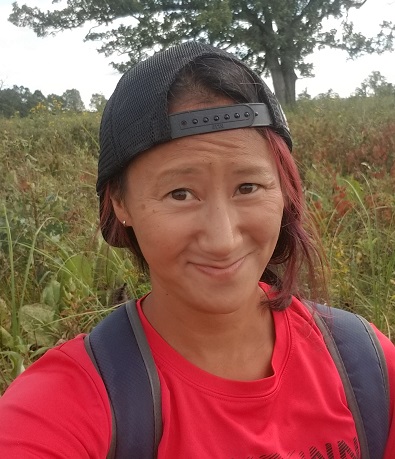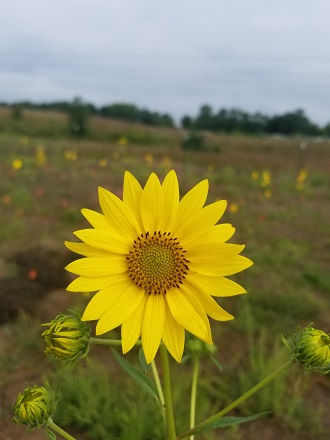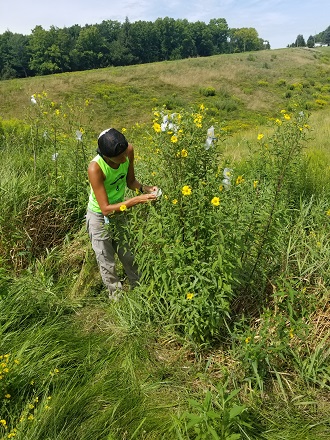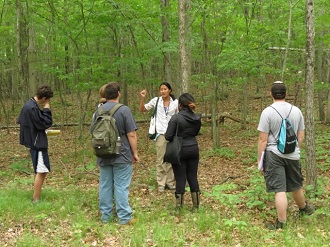About the department:
The University of Wisconsin – Eau Claire is a regional comprehensive university, part of the larger University of Wisconsin system. We are a primarily undergraduate institution, and the Biology department spans many diverse research and teaching topics. We have many opportunities to conduct hands-on research with undergraduate collaborators throughout the academic year and summer months
About the research:
I am broadly interested in plant evolution and hybridization at multiple phylogenetic and temporal scales. Our lab uses long-term field experiments, population genetic studies, phylogenomics, and comparative methods to ask questions about the evolutionary consequences and mechanisms of hybridization in plants. We are currently working on documenting patterns of genetic and trait diversity of perennial Helianthus (sunflower) species in the Upper Midwest in both natural and common garden environments. My research philosophy is to learn more about these fundamental and fascinating questions in evolutionary biology while empowering students to gain research experience that will help them to discover and achieve their career goals.
What has been the biggest challenge as a new PI so far?
I think the biggest challenge has been the move from postdoc (99% research) back to focusing on teaching/mentoring/service, and finding the right balance. This has been especially hard during the pandemic, where it is unclear how research productivity would go during a 'normal' year (whatever that is!). l love all aspects of being at a primarily undergraduate institution (PUI), but that does not mean that it's without challenges! Sometimes I see the term "PI" and wonder if it applies to me, since I am not at a large research institution, but in some ways researchers are even more "principal" at PUIs! I play many roles in the lab, those that would usually be held by technicians/managers, postdocs, grad students, etc., but it has also been amazing to be more hands-on and get to work with undergraduate researchers more closely. I am extremely grateful for that aspect of this job.
How do you/will you approach mentoring new lab members?
At a PUI almost all lab members are new lab members, which is exciting and challenging at the same time. I try to develop group cohesiveness because a lot of what we do is very teamwork oriented. They have different backgrounds in biology, so I try to scaffold their research skills by reading different papers, hands-on lab and field training, and even learning R! Lab members also have very diverse career goals (medical-oriented vs ecology/evolution-oriented), so I try to focus their skills and give them resources as individuals to help them get what they need.
When was your first Evolution Meeting, and how did it affect your career?
My first Evolution Meeting was in 2016 in Austin, Texas, which was the last summer before I defended my Ph.D. It was really great to meet with and talk to some many people whose work I had read and followed closely. I did not know it at the time, but my postdoc would bring me back to live in Austin for an extended summer of fieldwork! It was hot at the meeting, and it was hot in the field too (and I quickly discovered that there are more fire ants in the field than in the conference center).
Do you remember your first publication in Evolution or Evolution Letters (acceptance or rejection)?
The first paper I submitted to Evolution ended up being rejected after resubmission, which was definitely disappointing at the time (the main conclusions were not impactful enough), but we transferred it to Ecology and Evolution pretty smoothly, and now I'm an Associate Editor at Ecology and Evolution so I think it worked out pretty well! I think that we need to do a better job conveying the fact that rejection is common in our field, and that rejection (or major revisions) does not necessarily mean that the work is bad, just that there are ways to make it stronger or the fit is not right for that particular journal/grant.
Do you teach evolution? What concept blows students’ minds?
I teach an upper-level undergraduate course in Evolution - students come from a diversity of backgrounds and interests in biology. This semester we started with reading and discussion of the Graves (2019) article "African Americans in evolutionary science: where we have been, and what’s next" published in Evolution: Education and Outreach. Most students reflected that they had not discussed or learned about aspects of racism in science, or sometimes in their education more broadly. Others began to tie together concepts they had learned in other courses and how they relate to the "who" of science and evolutionary biology.
The other concept that really sparks them is the evolution of behavior, such as aspects of sexual selection or migration in relation to climate change. As a plant person I find this a little disappointing, but I think some of them are still floored by the fact that some plants have separate sexes, too!
What book should every evolutionary biologist read?
These may be subfield-specific, but I really like "The Ecology of Adaptive Radiation" (Dolph Schluter) and "A Primer of Ecological Genetics" (Jeffrey Conner and Daniel Hartl), both are books I keep referring back to for both teaching and research.
In a slightly different direction, for plant people or those on the ecological side of evolution, definitely "Braiding Sweetgrass" (Robin Wall Kimmerer) - so insightful, beautifully written, and just a perfect blend of science and Indigenous teachings.
What one piece of advice would you give to a starting graduate student?
Think about what skills and experiences you want or need for your future - if you don't know what that future is, that's okay too! In particular analytical skills (*cough* R *cough*), writing, and teaching are transferable to many different careers. Also don't be afraid of failure, and don't forget that as a graduate student you are also a person, and to try to maintain the personal relationships, hobbies, etc. that make you you.
What is something most people don’t know about you?
Many people do not know that I was adopted from South Korea as a baby and I do not know any biological relatives at all! This may seem odd for a person who teaches about resemblance among relatives, population genetics, etc., but for me it is normal.
What do you enjoy doing in your free time?
I love running, playing ultimate frisbee, xc skiing, etc. I actually picked up ultimate in the third year of my Ph.D., and it has been a great way to make friends, connections, and stay active as I've moved across the country multiple times for work. I even (volunteer) coached as a postdoc, and have just started coaching again at UWEC!
 Nora Mitchell
Nora Mitchell

